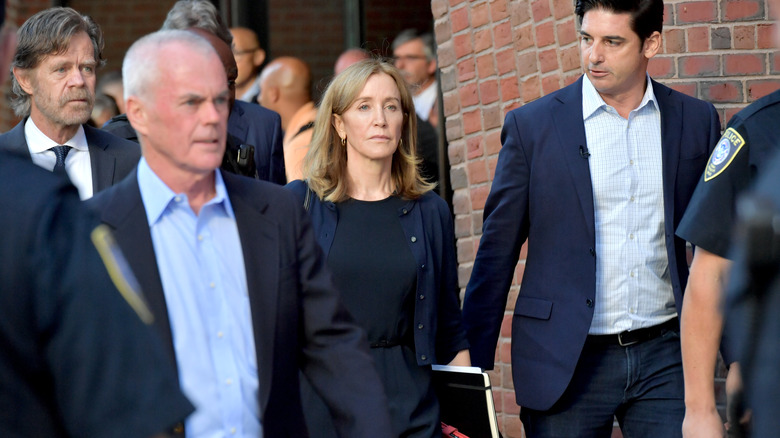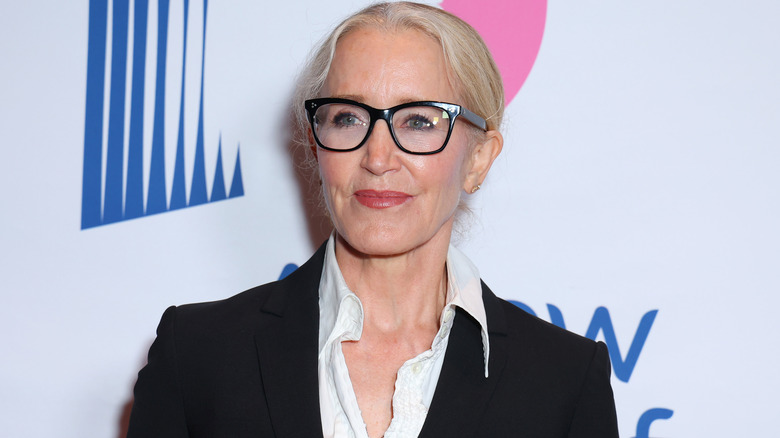Body Language Expert Tells Us Where Felicity Huffman's Scandal Apology Went Completely Wrong
Felicity Huffman is possibly best known for her role on "Desperate Housewives" from 2004 to 2012, but it is her real-life role in "Operation Varsity Blues" that made headlines in 2019. That was the name the FBI gave their investigation into nearly three dozen parents who got their kids into college through fraudulent means. In Huffman's case, in December 2017, she paid $15,000 to ensure her daughter Sophia Grace Macy got a good score on her SAT exam.
Huffman spent 11 days in jail, did 250 hours of community service, and paid $30,000 for her role in the scandal. Huffman's role in the college cheating scandal also strained her marriage to William H. Macy.
Huffman has now broken her silence years after the scandal was made public. In an interview with Eyewitness News, Huffman said, "It felt like I had to give my daughter a chance at a future, which meant I had to break the law."
Nicki Swift asked Jess Ponce III, body language expert, communication coach, and author of"A.W.E.S.O.M.E.": Seven Keys to Unlocking the Speaker Within, what he noticed in Huffman's explanation for her part in the college admissions scandal. He saw the interview as a missed opportunity and an example of Huffman's "privilege. It is the sense of privilege and entitlement that originally made this scandal noteworthy. And, here Felicity is once again showcasing it."
Felicity Huffman was genuine as she talked about her part in the scandal
As of 2023, it had been nearly six years since Felicity Huffman drove her daughter Sophia Grace Macy to the SAT exam, knowing that her test results would be great no matter how Macy actually did on the test. Instead of putting it behind her, however, Huffman talked about it. "Admitting you're wrong is never an easy task," Jess Ponce III said of Huffman's interview. "Now imagine choosing to admit fault and apologizing for your actions well after an issue has been settled. That's exactly the stance Felicity Huffman took in her interview this past week."
Jess Ponce III did point out that Huffman made a choice to talk about the scandal on TV, which meant she was facing up to her actions. "She chose to address this issue," he said. "She could have avoided the topic or declined being interviewed altogether. She willingly stepped into the spotlight of criticism."
Huffman's side of the story did seem heartfelt and genuine for Ponce III. "Everything about her body language indicates that she was sincere in her responses," he told us. "Her eyes were soft and glossy. Her facial gestures and glances downward suggest her answers were thoughtful and heartfelt. Her tone and cadence appropriately set a mood of remorse."
However, Felicity Huffman's privilege was showing
However, the big miss for Jess Ponce III in Felicity Huffman's interview is how she didn't address the privilege that she, and by extension her daughter, have that enabled them to get into the mess in the first place. "Felicity said in her interview that at the time she felt her actions 'were the only option she had to give her daughter a good future,'" Ponce III pointed out. "She also commented that she felt she would 'have been a bad mom if she didn't do it.' I wonder if the average parent without tens of thousands of dollars at their disposal would agree this was their 'only option.'" Good question!
Huffman explained that Rick Singer, the mastermind behind the scandal, had told her that after working with her daughter Sophia for a year, Sophia's test scores in math wouldn't be high enough for her to get into college. As a successful actress married to a successful actor, Huffman definitely had the cash that many others might not have, putting her in a position of privilege where she could've found other, more legal, options.
"She did apologize to the academic institutions, but what about the other parents or students who don't have her same resources?" Ponce III wondered. "Felicity sincerely addressed the issue but missed the bigger issue at hand. Is this what people refer to as tone deaf?" Overall, he saw it as a "missed opportunity [to do] some great reputation management." So now we're left with Huffman's privilege as her ongoing reputation.


